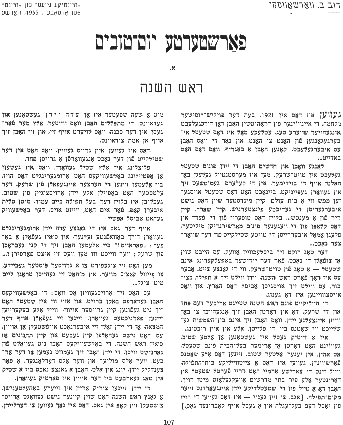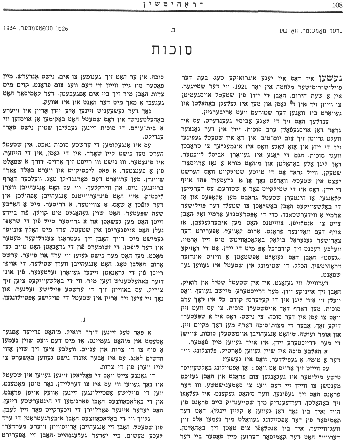Previous Page
|
Next Page

[
Page 107
]
| Dov B. Warshavsky |
Today's News from TODAY |
| |
October 6, 1935, Warsaw |
SPOILED HOLYDAYS
A.
ROSH HASHANAH
In 1921, during the Polish-Russian War, the residents of Drohitchin lived through unbelievably difficult days. The town went back and forth from one side to the other several times. Only those who lived through those days can have an idea what that meant.
The Jews in Drohitchin lived through fear of their lives for several weeks and months. People usually stayed in hiding in their attics, cellars, going through suffering and torment. At night the town looked like a cemetery, without the slightest ray of light to penetrate the darkness or rustle or move of a single person. All that was heard was the neighing of the horses and the clattering of the military wagons, which occasionally penetrated the silence of the dark night.
Daytime started giving way to evening, another frightening day for the Jews. This time, however, it was Rosh Hashanah, and Jews were praying together. They felt like letting their hearts pour out and weep a little.
The holiness of Rosh Hashanah rose above the fear and worry. Here and there a few Jews showed up; they were sneaking around like shadows, headed in the same direction.
There was an old house on a side street. A poor Drohitchin Jew lived there, and all the shadows disappeared inside. His house was used as a makeshift synagogue because the Czar's army was in control of three quarters of Drohitchin, and had burned down all four synagogues, so it was in this house that some of the Jews arranged to hold their prayer services. (By the way, to be more exact, this house belonged to Yossel the wagon driver at a side street on Kobrin Street).
An hour later a group of Jews stood and prayed. As they went on, the congregants started forgetting about the danger they faced, and were able to pray earnestly. Their prayers were a huge cry that cast great fear into the stillness of the night.
Suddenly, there was total silence. What happened? A group of Bolsheviks surrounded the house, and everybody's hearts pounded from fear. The eldest ordered all Jews to leave the house. Only the cantor remained at his spot with his tallith [prayer shawl] over his head. Apparently the Bolshevik was in awe of him.
On the street the entire congregation was surrounded by armed soldiers who barked out the order, “Get going!” Everyone's knees were shaking from fear, and they were wondering where they were being sent. They were led to a large empty building, Feivel Katz's Wall, and told to carry bricks and clay.
This is what happens: the Bolsheviks needed to bake bread, and since Drohitchin didn't have a large oven because all bakeries were destroyed, they came up with the idea that the Jews should build an oven overnight. No appeals and begging about Rosh Hashanah did any good. The Bolsheviks didn't want to hear about it. The Jews had to get to work, some as bricklayers and others as assistants. A couple of dozen Jews, young and old, worked throughout the night until the oven was complete.
The Jews then went back into hiding. For the rest of Rosh Hashanah, no one dared stick his head out the door, but this was still tolerable.

[
Page 108
]
The Moment, Warsaw
September 26, 1934
B.
SUKKOT
In those uneasy times during the Polish-Russian War in 1921, the Jews hesitated to appear on the streets, and remained in hiding, waiting for the storm to pass.
Finally, the situation improved somewhat just before the eve of the Sukkot holiday. Jews the world over were preparing for the holiday, but in Drohitchin the situation made it virtually impossible to even think about Sukkot. Even though the situation eased a little, everyone remained in hiding and was scared to their head out because the deathly silence in town cast greater fear in town. However, it was the calm before the storm. There were rumors that trenches were being built behind the town, and that the Bolsheviks were preparing an attack on the Polish army so that the retreating army could have time to escape. Secondly, people heard that the Czar's general, Bulak Balakhovitch and his army were operating at the Volhyn front near Kovel, and taking revenge on the Jews before anything else. These “guests” were supposed to be visiting Drohitchin. The situation in town was tense.
In the meantime, as mentioned, the town was calm and quiet. A few of the more courageous Jews were wondering what they were going to be doing in the cellars. First of all, it was the eve of Sukkot, they had to build sukkah huts, and were thinking about whether there would be food to eat in the sukkah. Whatever the case, they had to fulfill the commandments of the holyday of Sukkot. So they started to build sukkah huts. Among those courageous Jews was my own father. Half a sukkah was already ready, and then suddenly turmoil, a clamor. What happened?
Apparently a group of Bolshevik soldiers went to the front and were looking for people to show them the way to Somenitscha, which was on the front. Whoever knew had to go into hiding. When the commissar of the group noticed me standing in front of the house (I was a small child at that time), he wanted to take me along as his guide. I ran to my father to hide. In the meantime, the commissar saw my father next to the sukkah, and he went over to him and told my father that he would have to show him the way to the front. We desperately tried to appeal to him, and the commissar waved his hand and left.
After this, all the Jews went back into hiding, and the town seemed like a cemetery. The sukkahs remained standing unfinished. The first night of Sukkot arrived. No one could hear anything. The slightest ray of light shining through a crack in a window disappeared immediately. People were waiting for the next day that would bring some news. As soon as daylight appeared there were sounds of one shot, then another and a third. This was followed a half-hour later by bullets. Shots were fired from both directions, and a large amount of shrapnel tore through town. Dirt and wood was mixed up with smoke, rising several dozen meters into the air. The hum of grenades was deafening. No one could see anything besides earth and fire. Around the middle of the day the situation quieted down, and there were fewer grenades. From our hiding places we could see the Bolsheviks pulling back, and the first Polish soldiers appeared in town, followed by Polish army units.
C.
A few days passed peacefully. We were breathing easier, and we thought that our suffering and difficulties, which lasted for months, would be coming to an end. Unfortunately, we weren't lucky enough to avoid further suffering.
The whole time the Poles were in Drohitchin there were ongoing problems. However, as soon as the Polish units went off to the front, and the Bolokhov gangs pulled back, everyone became scared for his life. As soon as the Bolokhov gangs passed through, they started with their murderous acts. On every occasion they operated
Previous Page
|
Next Page
This material is made available by JewishGen, Inc.
and the Yizkor Book Project for the purpose of
fulfilling our
mission of disseminating information about the Holocaust and
destroyed Jewish communities.
This material may not be copied,
sold or bartered without JewishGen, Inc.'s permission. Rights may be
reserved by the copyright holder.
JewishGen, Inc. makes no representations regarding the accuracy of
the translation. The reader may wish to refer to the original material
for verification.
JewishGen is not responsible for inaccuracies or omissions in the original work and cannot rewrite or edit the text to correct inaccuracies and/or omissions.
Our mission is to produce a translation of the original work and we cannot verify the accuracy of statements or alter facts cited.
 Drogichin, Belarus
Drogichin, Belarus
 Yizkor Book Project
Yizkor Book Project
 JewishGen Home Page
JewishGen Home Page
Yizkor Book Director, Lance Ackerfeld
This web page created by Lance Ackerfeld
Copyright © 1999-2025 by JewishGen, Inc.
Updated 10 Dec 2001 by LA

 Drogichin, Belarus
Drogichin, Belarus
 Yizkor Book Project
Yizkor Book Project
 JewishGen Home Page
JewishGen Home Page